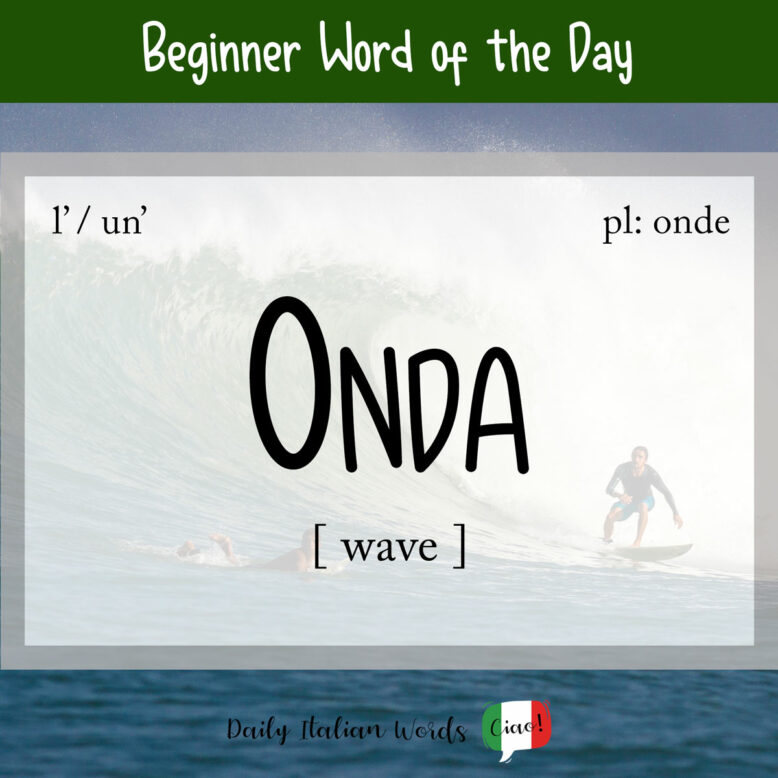As I sit here writing this word of the day, I am looking out over the sea (mare), soaking in the sound and smell of the waves crashing against the shore. The Italian word for this phenomenon is onda (feminine, plural: onde), which derives from the Latin unda.

Below are a few useful verbs that are often used when describing the interplay between waves and the shore (riva) or rocks (scogli) in Italian:
- le onde sbattono sulla riva / sugli scogli = the waves hit the shore / the rocks
- le onde si infrangono sulla riva / sugli scogli = the waves crash against the shore / the rocks
- le onde bagnano la riva = the waves lap against the shore (lit. the waves wet the shore)
Le onde si infrangono sugli scogli con violenza.
The waves crash violently against the rocks.

As in English, onda is used to refer not only to the waves formed on a body of water (acqua), but also the passage of undulating motion, heat or sound. A few very common examples include:
- onda radio = radio wave
- onda luminosa = light wave
- onda elettromagnetica = electromagnetic wave
- microonda = microwave
- onda d’urto = shock wave
Andare in onda (lit: to go on the wave) and essere in onda (lit: to be on the wave) in radio and television terminology is how Italians say to go on air / to go live and to be on air / to be live.
Andiamo in onda tra cinque minuti!
We’re going on air in five minutes!
Another common phrase is mandare / mettere in onda (lit: to send / put on the wave) meaning to broadcast. The terms in onda and fuori onda translate as on air and off-air respectively.

Metaphorically speaking, onda can describe any sudden occurrence of or increase in a feeling or emotion such as, for example, un’onda di ricordi (a flood of memories) or un’onda di emozioni (a wave of emotion).
A onde, a synonym for the adjective ondulato (wavy), is seen in expressions such as capelli a onde (wavy hair) and camminare a onde (to sway).
It is also used to describe large groups of people or quantities of things that burst forth with overwhelming force, like for example l’onda della folla (the surge of the crowd).
Another very commonly used word that derives from onda is the feminine noun ondata which in literal terms means big wave or surge, and in figurative terms, a large number of people or things that spread, strike or move impetuously like a violent wave.
- un’ondata di gente = a flood of people
- un’ondata di caldo = a heat wave
- un’ondata di dolore = a wave of pain
- un’ondata di insulti = a surge of insults
È in arrivo una grossa ondata di caldo con temperature superiori ai quaranta gradi!
A big heat wave is coming with temperatures above 40 degrees!
Expressions featuring the word ‘onda’
Essere sulla stessa lunghezza d’onda
Literal translation: to be on the same wavelength
English meaning: to be on the same wavelength
Seguire l’onda
Literal translation: to follow the wave
English meaning: to follow the crowd or the latest trends
Essere sulla cresta dell’onda
Literal translation: to be on the crest of a wave
English meaning: to be on the crest of a wave, to be at a successful point in one’s life or career
Heather Broster is a graduate with honours in linguistics from the University of Western Ontario. She is an aspiring polyglot, proficient in English and Italian, as well as Japanese, Welsh, and French to varying degrees of fluency. Originally from Toronto, Heather has resided in various countries, notably Italy for a period of six years. Her primary focus lies in the fields of language acquisition, education, and bilingual instruction.


